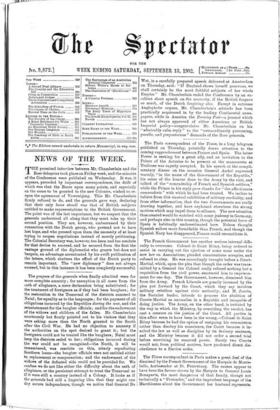The French Government has another serious internal dn. culty to
overcome. Colonel de Saint Remy, being ordered to assist in carrying out the ejection of some nuns under the new law on Associations, pleaded conscientious scruples, and refused to obey. He was accordingly brought before a Court- Martial, which, upon the plea that though the order was trans- mitted by a General the Colonel really refused nothing but a requisition from the civil power, sentenced him to imprison- ment for one day. The Government, however, dismissed him from the Army. French Liberals are greatly incensed by the plea put forward by the Court, which they say involves military rebellion against civic authority; and M. Jatiriu3, the Socialist leader, intends to propose the abolition of Courts-Martial as anomalies in a Republic and incapable of doing justice. The Army, on the other hand, is irritated by the way in which the Ministry, by overriding the verdict, has cast a censure on the justice of the Court. All parties in this affair seem to have been in the wrong,—Colonel de Saint Remy because he had the option of resigning his commission rather than disobey his conscience, the Court because it in- sulted the law as well as discipline by its derisory sentence, and the Ministry because it did not order a second trial before exercising its reserved power. Surely two Courts would not, from political motives, have pardoned direct dis- obedience to a Service order.






































